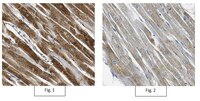Alterations in myostatin expression are associated with changes in cardiac left ventricular mass but not ejection fraction in the mouse.
Artaza, JN; Reisz-Porszasz, S; Dow, JS; Kloner, RA; Tsao, J; Bhasin, S; Gonzalez-Cadavid, NF
The Journal of endocrinology
194
63-76
2007
Kivonat megmutatása
Myostatin (Mst) is a negative regulator of skeletal muscle in humans and animals. It is moderately expressed in the heart of sheep and cattle, increasing considerably after infarction. Genetic blockade of Mst expression increases cardiomyocyte growth. We determined whether Mst overexpression in the heart of transgenic mice reduces left ventricular size and function, and inhibits in vitro cardiomyocyte proliferation. Young transgenic mice overexpressing Mst in the heart (Mst transgenic mice (TG) under a muscle creatine kinase (MCK) promoter active in cardiac and skeletal muscle, and Mst knockout (Mst (-/-)) mice were used. Xiscan angiography revealed that the left ventricular ejection fraction did not differ between the Mst TG and the Mst (-/-) mice, when compared with their respective wild-type strains, despite the decrease in whole heart and left ventricular size in Mst TG mice, and their increase in Mst (-/-) animals. The expected changes in cardiac Mst were measured by RT-PCR and western blot. Mst and its receptor (ActRIIb) were detected by RT-PCR in rat H9c2 cardiomyocytes. Transfection of H9c2 with plasmids expressing Mst under muscle-specific creatine kinase promoter, or cytomegalovirus promoter, enhanced p21 and reduced cdk2 expression, when assessed by western blot. A decrease in cell number occurred by incubation with recombinant Mst (formazan assay), without affecting apoptosis or cardiomyocyte size. Anti-Mst antibody increased cardiomyocyte replication, whereas transfection with the Mst-expressing plasmids inhibited it. In conclusion, Mst does not affect cardiac systolic function in mice overexpressing or lacking the active protein, but it reduces cardiac mass and cardiomyocyte proliferation. | 17592022
 |
Myostatin inhibits myogenesis and promotes adipogenesis in C3H 10T(1/2) mesenchymal multipotent cells.
Artaza, JN; Bhasin, S; Magee, TR; Reisz-Porszasz, S; Shen, R; Groome, NP; Meerasahib, MF; Fareez, MM; Gonzalez-Cadavid, NF
Endocrinology
146
3547-57
2004
Kivonat megmutatása
Inactivating mutations of the mammalian myostatin gene are associated with increased muscle mass and decreased fat mass; conversely, myostatin transgenic mice that overexpress myostatin in the skeletal muscle have decreased muscle mass and increased fat mass. We investigated the effects of recombinant myostatin protein and antimyostatin antibody on myogenic and adipogenic differentiation of mesenchymal multipotent cells. Accordingly, 10T(1/2) cells were incubated with 5'-azacytidine for 3 d to induce differentiation and then treated with a recombinant protein for myostatin (Mst) carboxy terminal 113 amino acids or a polyclonal anti-Mst antibody for 3, 7, and 14 d. Cells were also cotransfected with a Mst cDNA plasmid expressing the full-length 375-amino acid protein (pcDNA-Mst375) and the silencer RNAs for either Mst (pSil-Mst) or a random sequence (pSil-RS) for 3 or 7 d, and Mst expression was determined. Adipogenesis was evaluated by quantitative image analysis of fat cells before and after oil-red-O staining, immunocytochemistry of adiponectin, and Western blot for CCAAT/enhancer binding protein-alpha. Myogenesis was estimated by quantitative image analysis-immunocytochemistry for MyoD (Myo differentiation protein), myogenin, and myosin heavy chain type II, or by Western blot for myogenin. 5'-Azacytidine-mediated differentiation induced endogenous full-length Mst expression. Recombinant Mst carboxy terminal 113 amino acids inhibited both early and late markers of myogenesis and stimulated both early and late markers of adipogenesis, whereas the antibody against Mst exerted the reverse effects. Myogenin levels at 7 d after transfection of pcDNA-Mst375 were reduced as expected and elevated by pSil-Mst, which blocked efficiently Mst375 expression. In conclusion, myostatin promotes the differentiation of multipotent mesenchymal cells into the adipogenic lineage and inhibits myogenesis. | 15878958
 |


















